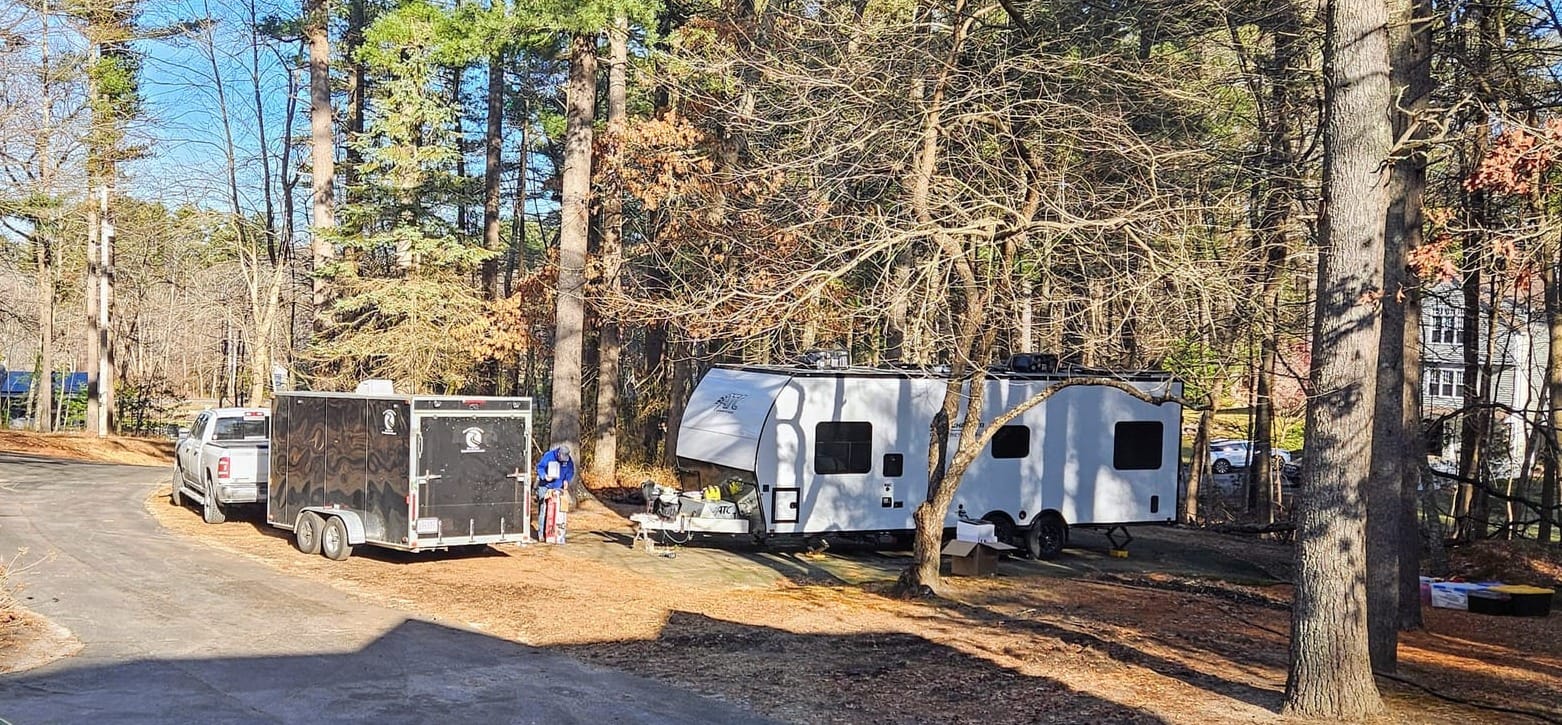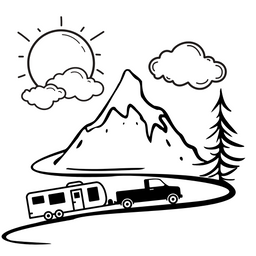No heat → no water: The rabbit hole of winter repairs
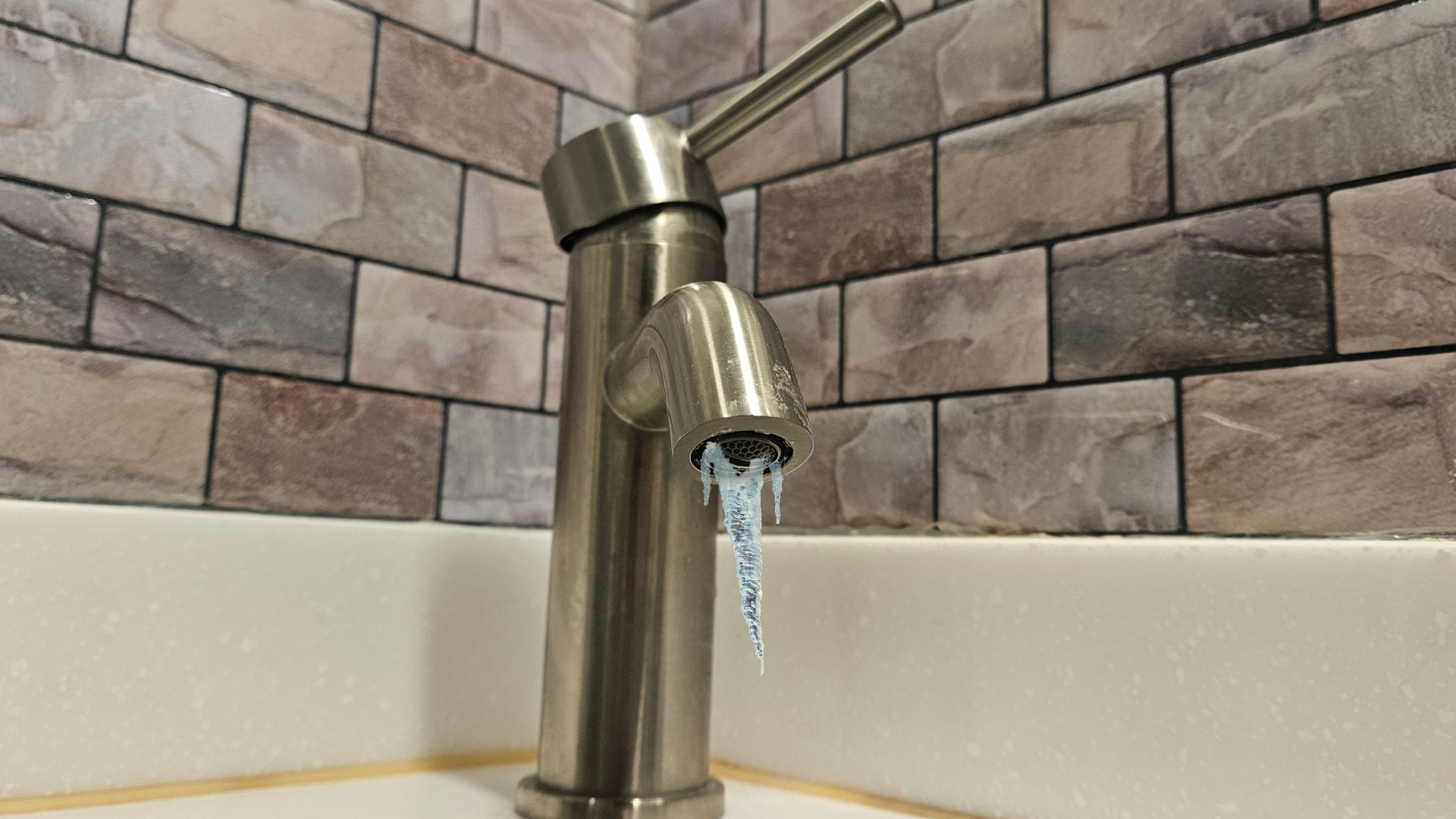
Read it first: This was our RV's worst winter. Here's what we learned.
This post contains Amazon affiliate links. Qualifying purchases through these links help support our blog, at no extra cost to you. Simply click the link and make your purchases as usual. Thanks to all our readers!
When we stay stationary at our Massachusetts home-base through the holidays, we always run the risk of encountering winter weather. Sometimes we sit cozy inside our RV and watch winter coalesce around us. Other times, we battle the repercussions of the season. For us, the essentials for living in our RV are heat (or AC depending on the season), electricity, and running water. We're not full-time RVing to live a rugged lifestyle; we like the creature comforts. When we're on the road and lose one of these essentials, it's not fun, but we deal with it because we have to. And trust us, we have lost all of the essentials at one point or another. Sometimes, we've lost a bunch at once!
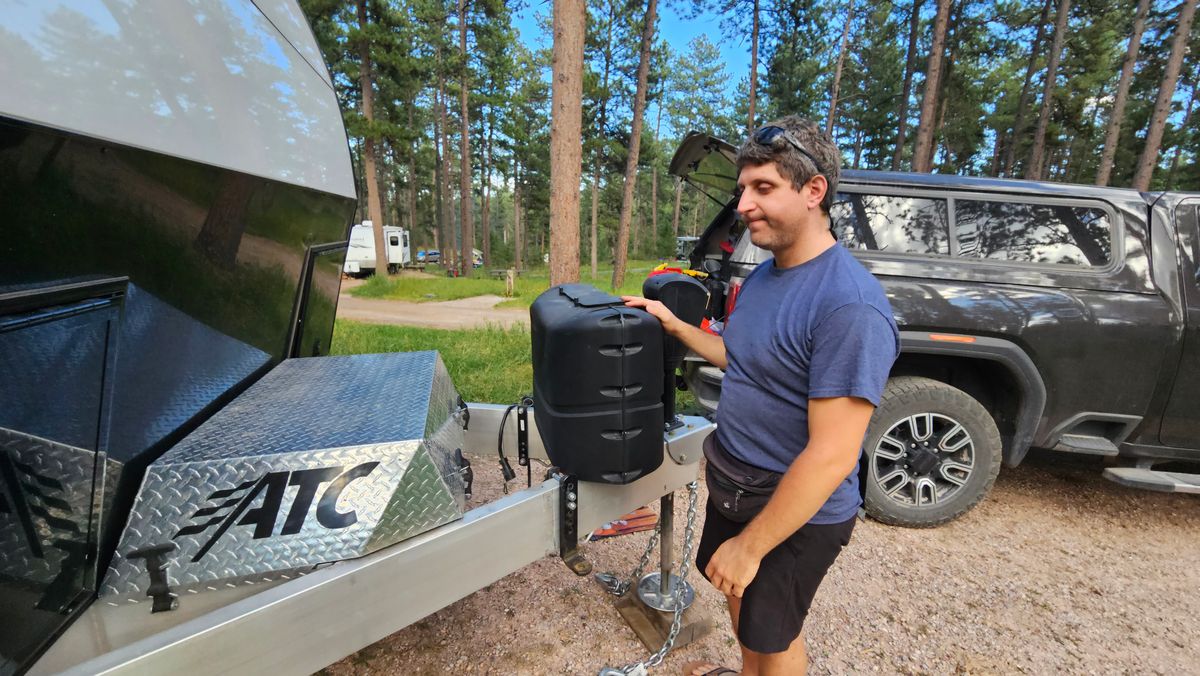
At least when we're traveling, we're mobile enough to bring our rig to repair shops and ATC dealers to get things working again. When we're stationary, we can't easily pack up and get somewhere, especially because RV repair places are scarce in MA to begin with. If the problem is fixable, we either need to do it ourselves or find a nearby RV mobile tech who's willing to come out in the winter. At the time of writing this, we know 1 mobile tech who fits this description.
Our stationary winter months for 2024-2025 included two visits from our mobile tech and countless hours of our own troubleshooting and repairs. Winter continuously snatched two of our essentials: heat and running water. Before we knew it, we had entered a vicious circle, where we would lose the heat, then the water, then we'd get them back, only to lose them once again.
It's no surprise to us that, when our heat goes, so does our water, but to understand this more requires me to outline the specific setup of our ATC toyhauler. We have several heating components that came on our trailer model. We have a 25,000 BTU/hour propane furnace with three heating vents throughout the rig. We also have electric heating pads on each of our holding tanks (fresh, gray, and black) and some of our water lines. The underbelly of our RV isn't insulated, and so our tanks and lines that run underneath are exposed to the elements. We also have a tankless water heater and a water pump, so we can get running water without connecting to a spigot. This is especially important in the winter, when spigots and hoses easily freeze.
Freezing water is what we most try to avoid in our rig, and under perfect circumstances, our setup allows us to live in our RV in temperatures below freezing. But, if one piece of equipment fails, it can cause a domino effect.
In December, we spent a few days in NH only to return to find out our heat stopped working. The inside temperature of the rig was in the 30s. It was easy to find the origin of this failure. When we checked our propane cylinders, we found one that was empty and the other full. The regulator was supposed to switch to the full one and never did. We were able to start drawing propane from the full tank, turn the furnace back on, and supplement the process with space heaters to get our rig warmed back up quickly.
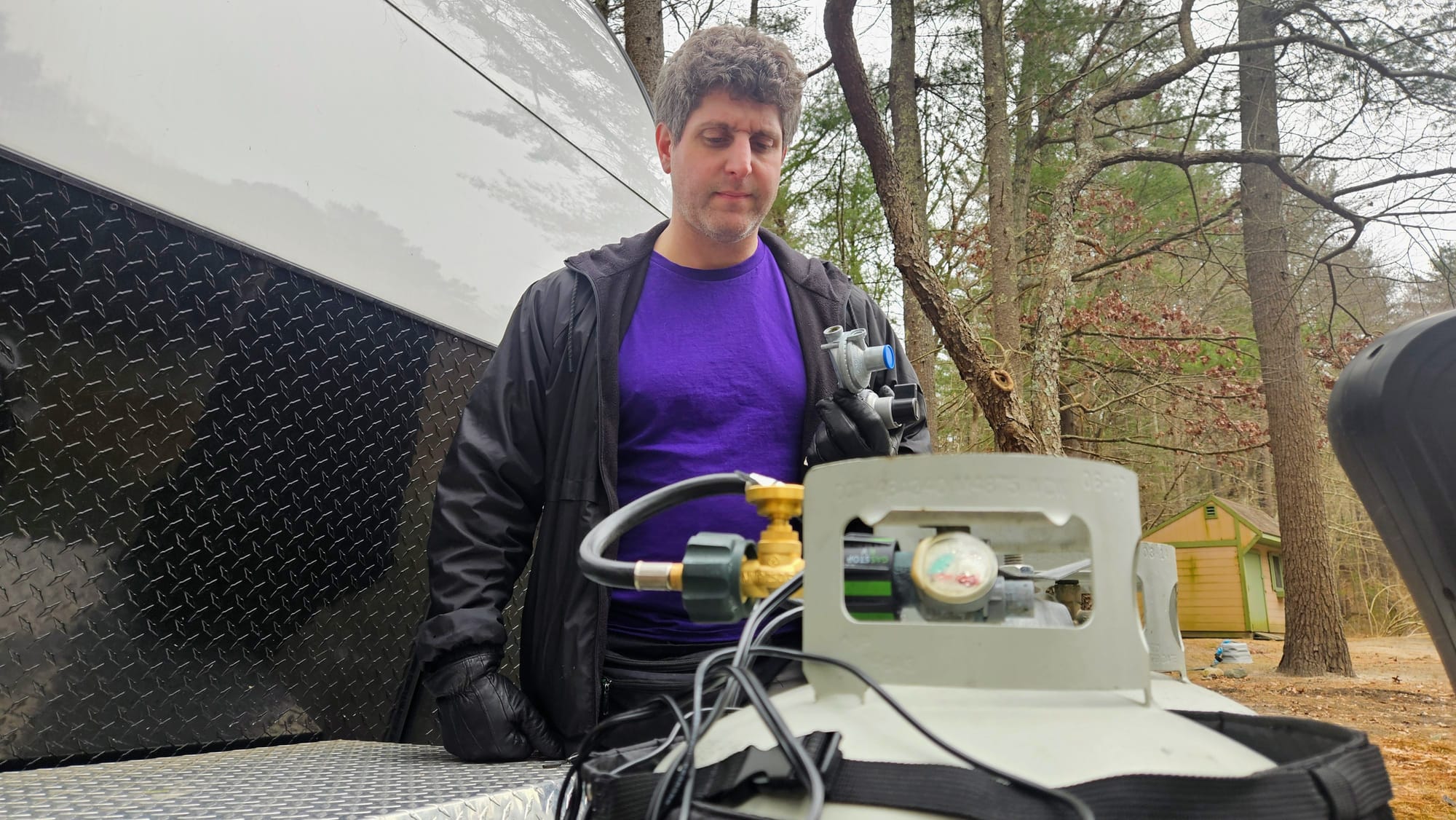
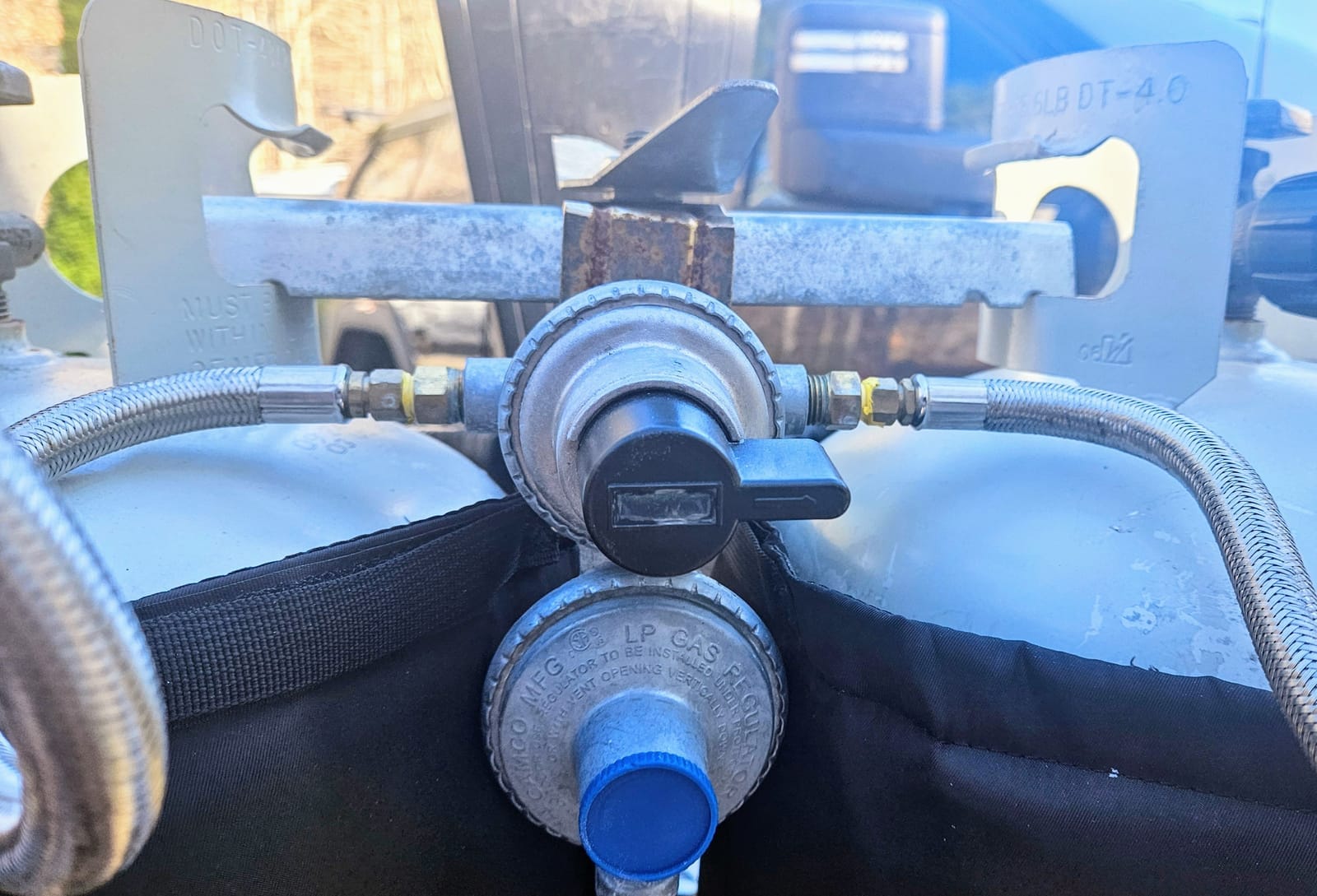
However, more damage had already been done. Where we lose heat, we often lose water, too. How does this happen? Even if all our tank and line heaters continue working, our rig relies on the ambient warmth inside our rig caused by our furnace. We have a mechanical cabinet that we access from the inside, but all its components connect to the outside. This is where our water pump is installed, as well as our water heater and furnace. The water pump, water heater, and lines in the cabinet reap the benefits of the toasty furnace when it's running, but when it's not, those components get blasted with cold winter air that comes through the many vents in that cabinet.
Similar to a house, we have plumbing lines that are partially indoors and partially outdoors. The inside lines usually stay functioning as long as there is heat in the RV, but if the RV turns cold and the outside is cold, those lines naturally become cold.
When our plumbing freezes, we run the risk of our pipes bursting. As we all know from our school days, water expands when it freezes due to the molecule structure becoming less dense. So, if a tank or line is filled with water and that water freezes, it can expand too much to stay contained. Thankfully, we've never had any plumbing burst on our RV, but after our NH trip, we did need to replace both our water pump and water heater. Whatever water was in each of them froze and caused them to stop working. Even though our water heater is tankless, there is always some residual water in it and the surrounding lines. This situation made us wonder if we should have drained our lines before we left, but we were relying on our furnace to continue heating our rig while we were gone. When it stopped working, it caused the rest of the dominoes to topple.
We replaced our water pump immediately because we already had one on-hand. We lived easily without hot water for several days, until we got that replacement and had our local mobile tech come and install it. Our heat continued running, but we noticed it wasn't pumping as well as it usually does, and our rig wasn't reaching temperature. At this point we weren't trusting our regulator, so in case it went faulty again, we ordered a replacement.
Sure enough, late one night, our propane regulator failed to switch over once again. We commended our foresight that we had a replacement on the way, but it hadn't arrived yet. We would be without heat for at least a day. We learned the hard way that regulators can't be exposed to cold air and moisture the way ours was this winter. Be sure to read the blog post to learn some helpful solutions to keeping the regulator and propane lines warm and dry.
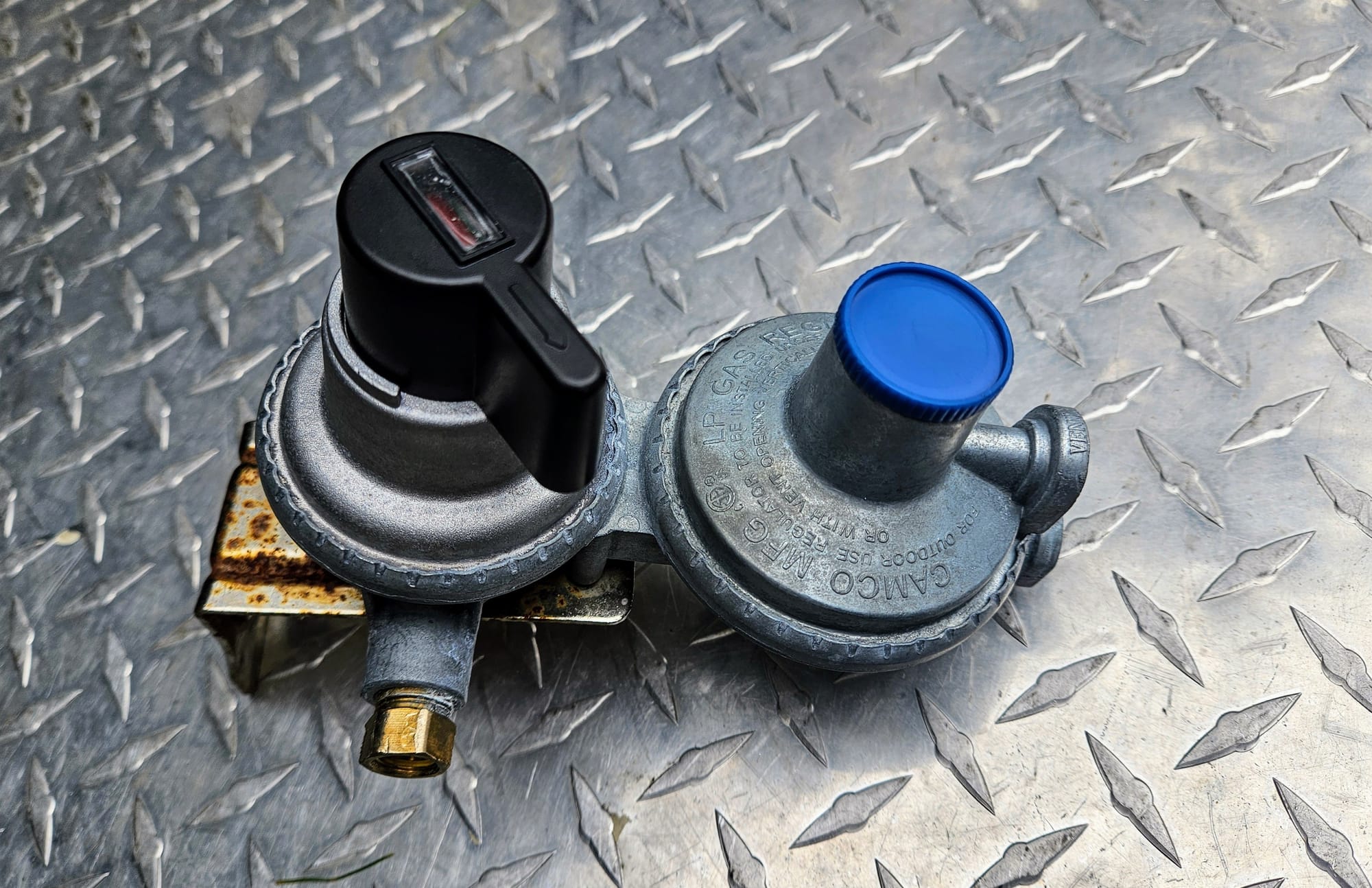
At this point, we had some decisions to make. We couldn't stay in the RV without heat, and running our space heaters 24/7 would cause us to deplete all of our battery power. When we're at our MA home-base, we only draw 8amp of power from Nicole's parents' garage, and for the rest we use our own setup, which doesn't get much solar power in the winter. We didn't want to be without heat, water, and electricity! I also thought back to our post-NH freeze and how I wish I had drained the lines. So this time, that's what I did. I didn't add any antifreeze, but I drained the fresh tank and lines as best I could, and we moved into the house, which had become a regular occurrence during this winter stay.
The regulator came by the end of the next day, and once installed, it worked great. We got our heat back! Time to fill the fresh tank back up and be done with this whole mess. Only, I couldn't. The spigot on the house was frozen. I was able to thaw it with a hair dryer, but our hose was frozen, too. I brought it inside and tucked it in the shower to thaw. The next day, I tried filling the fresh tank again and was able to get water flow from the hose. But, even after that, we still couldn't get running water into the RV. Why?
I did some troubleshooting. First, I ran water directly from the spigot by setting our valve to the city water connection. It worked! This was a good sign because it meant that we likely didn't have a leak in our plumbing. However, it meant that either the new pump was broken, or something was still frozen in a part of the lines near the fresh tank (which get bypassed when on city water).
We had had so many water pump issues over the years that I started collecting replacements, and so yes, I had one more left. I installed it. Still no water. Now we knew that we had frozen lines somewhere between the fresh tank and the pump. This was on a Monday, and temperatures wouldn't get above freezing all week. While we waited for the thaw, I did two things:
- I bought some heat tape to put on the lines
- I contacted the mobile tech, who needed to come out for a second visit anyway, and asked him to take a look and make sure I wasn't missing anything. I also asked him to help better wrap and insulate the lines with heat tape, once we had full confidence in which sections were the culprits.
That Friday was our first day that hit above freezing, and that day, it took three men, nature, and a whole lotta heat blasting and taping to get our plumbing working again. Now that the exposed lines are better insulated, hopefully we won't lose running water every time temperatures dip too low. We are still planning on buying a skirt, though, because we have a lot more cold-weather camping in our future.
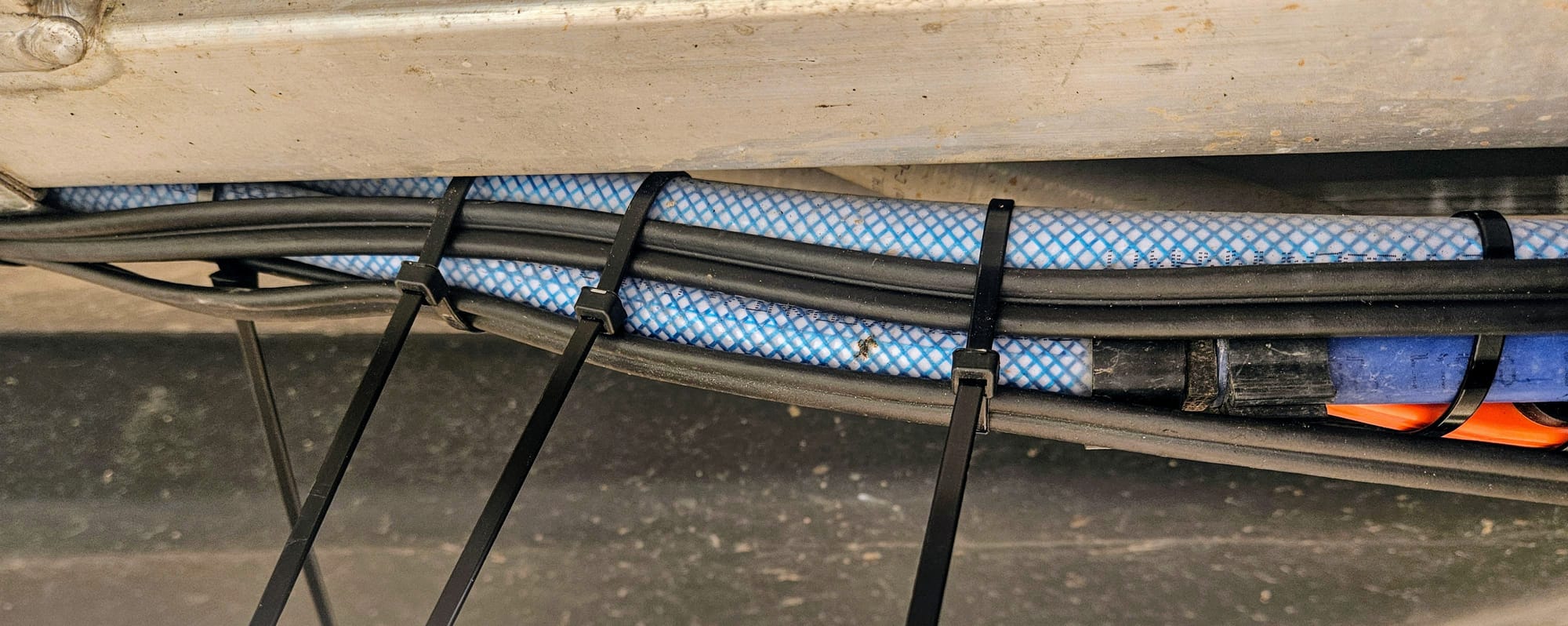
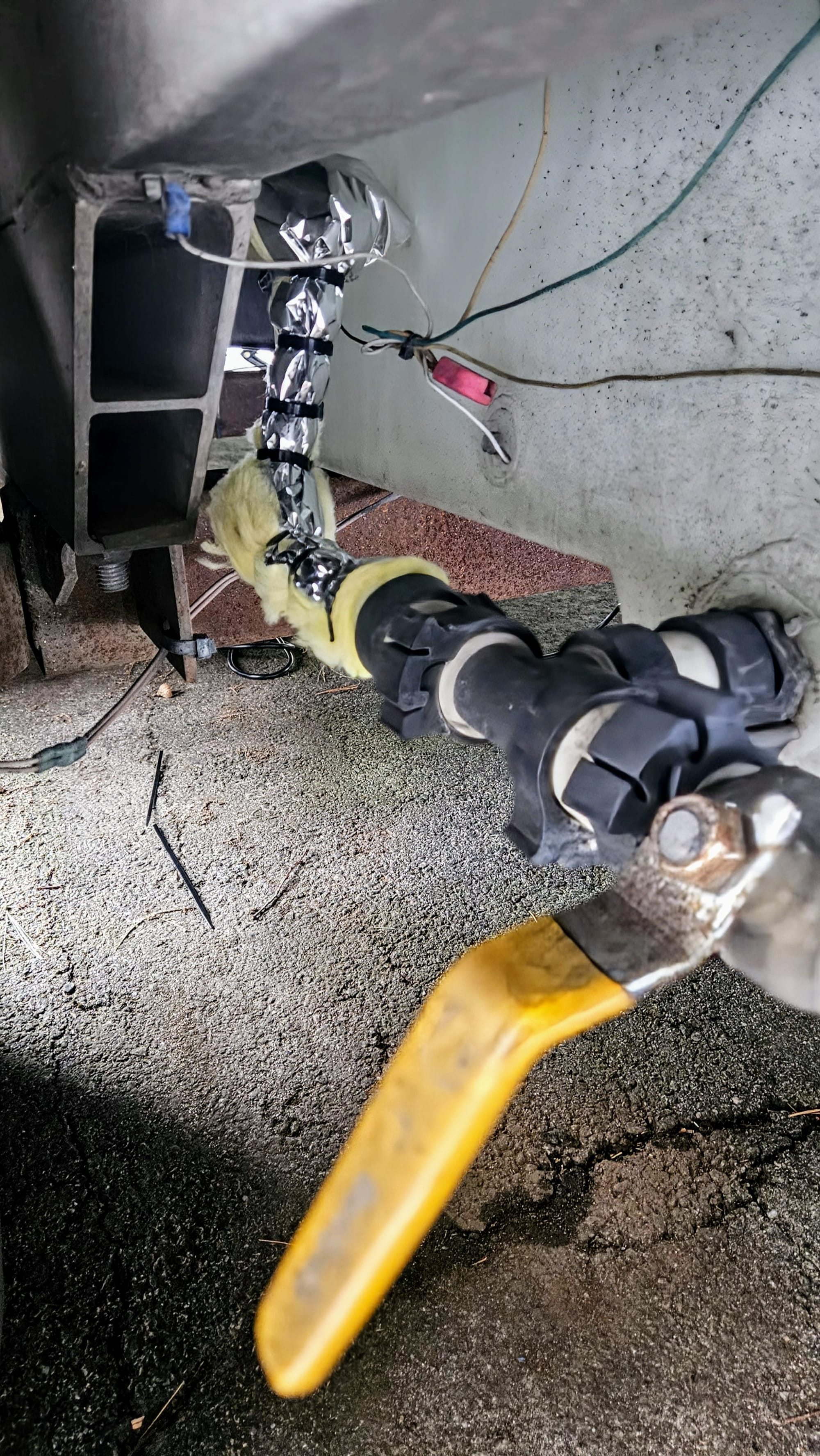
As for the water pump, we ended up keeping Replacement #2 and ditching Replacement #1 anyway. We had heard good things about Seaflo pumps, so we used this brand for our last two replacements. This new one was by USA Adventure Gear, and while it needed some maneuvering to fit into our mechanical cabinet, we liked it better than the Seaflo immediately. It's by far the quietest pump we've ever had, and given that the pump is in our bedroom, that's a big deal. Our mobile tech also pointed out that our Seaflo had a shut-off pressure of 70psi, which is well within the range our lines can handle, but not the plastic connectors between the lines. We did have an issue where one of those connectors broke and sprung a leak, while we were using our first Seaflo, with the same psi. The Adventure Gear pump is a 55psi, so hopefully we'll save some connectors.
Editor's note: By the time of publishing this post, it looks as though Adventure Gear USA has discontinued their water pumps. We are very sad that we hadn't stocked up on more! We really like this pump and it's a shame that it no longer seems available.
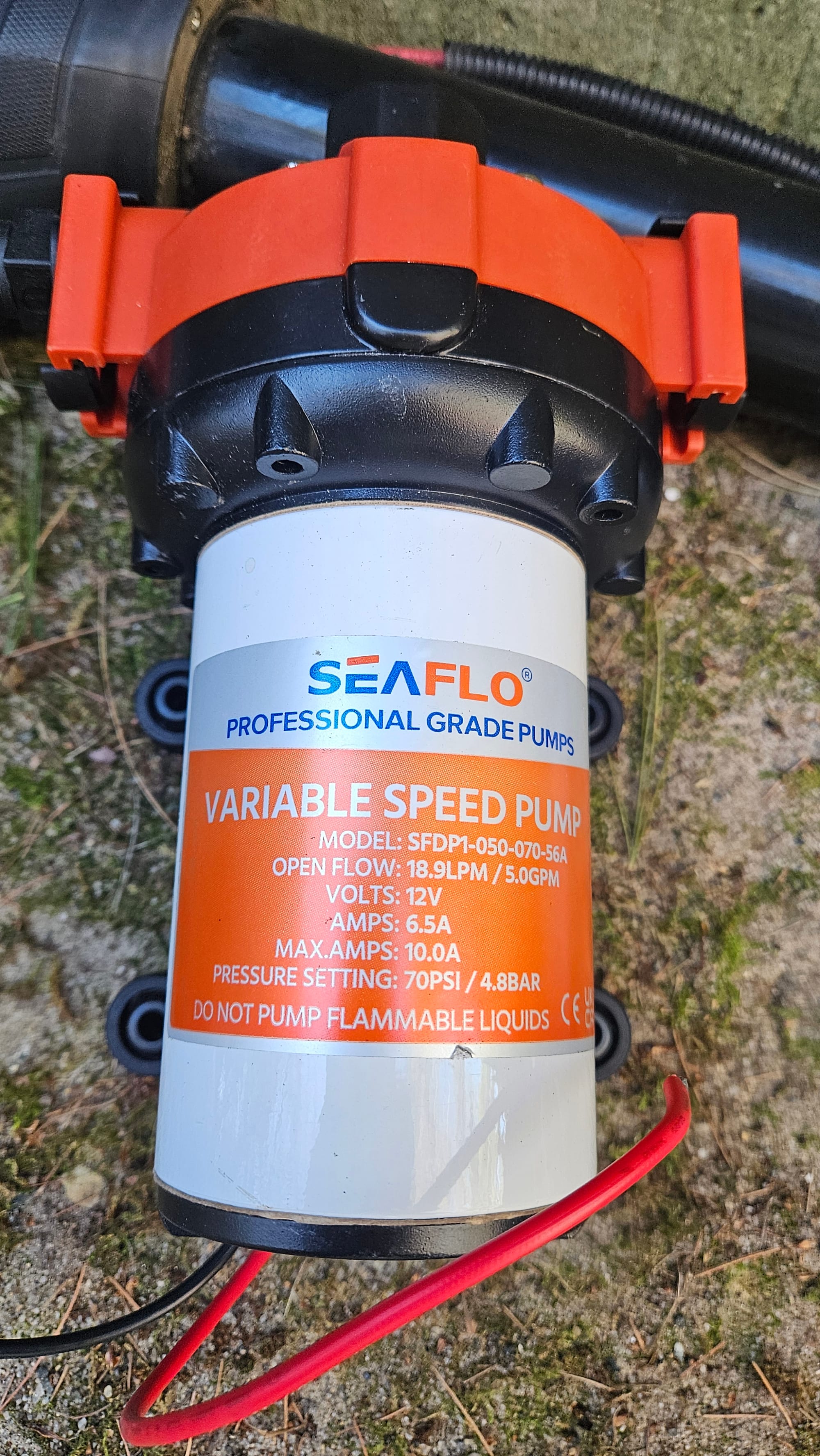
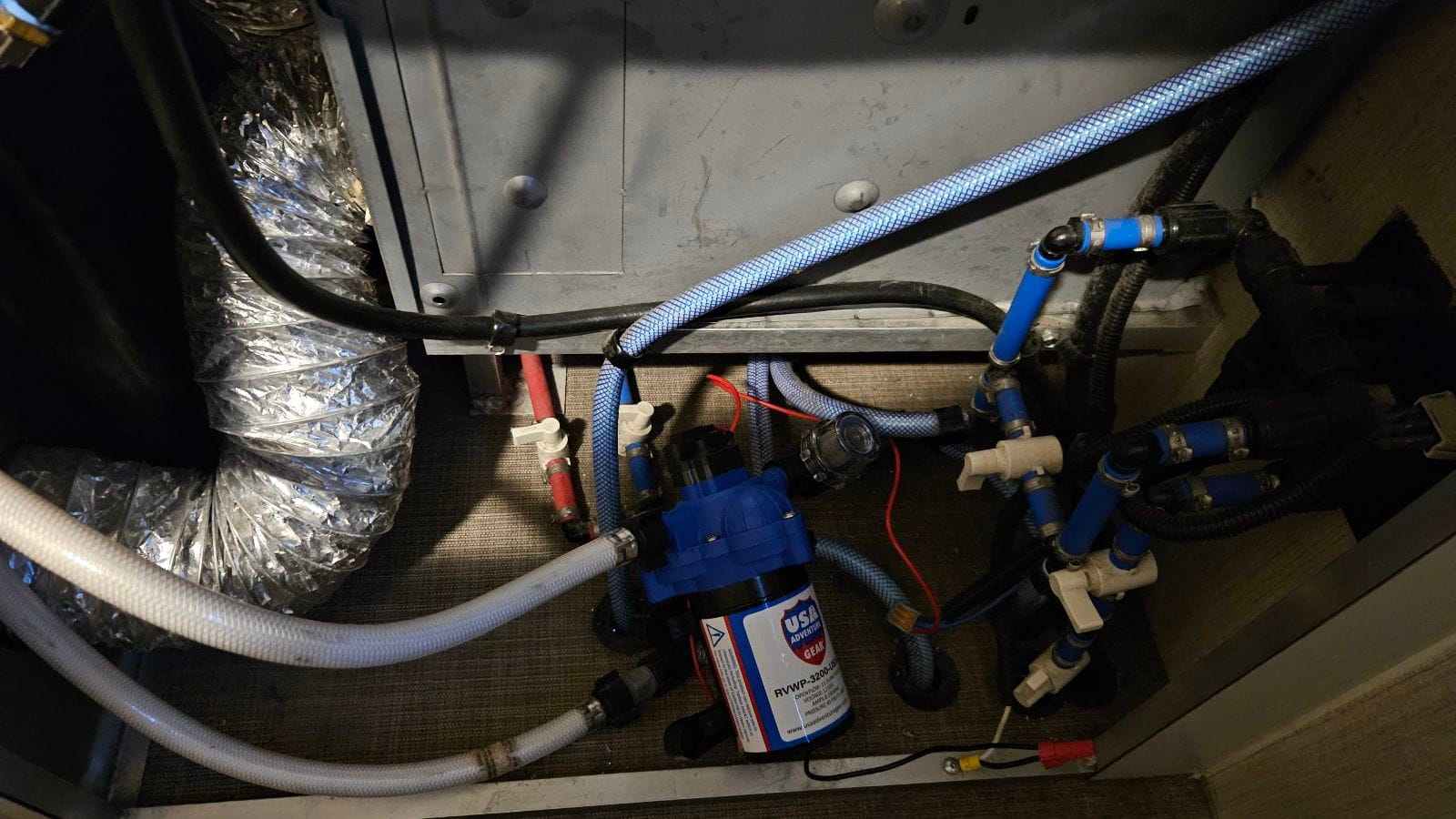
Getting our essentials back meant that the prospect of hitting the road was looking a little more likely, but we still had a long list of repairs that took a backseat as we faced the fury of frigid weather fixes. In addition to the usual cleaning, organizing, decluttering, and small repairs, we had two that we hoped to make a top priority during our stationary time, but after many setbacks, we were really coming down to the wire before the weather got even worse.
First up, we finally had all the parts we needed to fix our wobbly hitch. Last spring, we noticed that our hitch was wobbling much more than it's supposed to, and upon inspection, we saw that lots of parts were wearing down. The receiver sleeve wasn't fitting as snug, the pin was wearing away the hole, and the hitch head seemed to have gotten warped. This isn't something that's supposed to happen with a hitch as new as ours, but we put it through the ringer, traveling thousands of miles before it was adjusted correctly. I got a replacement receiver sleeve under warranty from GM, a new pin, and a new hitch head with hardware. I didn't yet have the right tools to install these parts myself, but we've had so many hitch issues over the years that it was now time. I began the assembly and put Rust-Oleum on the shank, but I had to let it dry overnight, and by then, the cold had moved in and other problems took precedence.
When we first called the mobile tech, we enlisted his help on our winter weather repairs, like installing the new water heater. We figured while he was there, we would have him install a new tongue jack, which we had planned to do ourselves but never got around to it. The jack that comes on our ATC is notorious for not being rated for the tongue weight. It's a decent jack feature-wise and is electric, so we can raise and lower the tongue with the press of a button. However, fellow ATC owners have complained that it breaks very quickly because it can't handle the pressure. Truthfully, we're surprised ours lasted as long as it did. We started having issues with it just a few months into full-time traveling. We were down in Florida, and whenever we tried to extend the jack, it would make a horrendous metal clanking sound that could be heard through the entire campground. We scoped it out to see if something was off-kilter, but we wouldn't be able to see anything without taking it apart. Soon after, the sound, for the most part, went away. We think the humidity had made it worse.
25,000 more miles and over a hundred campsites later, our jack was still with us. By this point we had begun calling him Jacques and saw beyond his flaws. He surprisingly survived the Utah flood craziness and only came away with a small bend in the plate. But, temperature fluctuations and moisture were causing problems on the head, where all the buttons are located. The plastic cover cracked, and we needed to put electrical tape over one of the buttons so the electric components wouldn't be exposed to the elements. We had plans to buy a replacement jack at the end of that year, winter 2023, but never got around to it. Then, towards the end of 2024, we realized we couldn't wait any longer. Jacques started making his deafening clanking sound again, and this time, the humidity didn't matter. We ordered a new jack from eTrailer, and Jacque Deux arrived at our doorstep and waited patiently for installment.
Only, when the mobile tech went to install it, he discovered that the head was cracked. It must have happened in shipping. We hadn't even taken it out of its box yet, so we had no idea. Back to eTrailer it went, and we waited for a replacement to our replacement. Unfortunately, eTrailer didn't have anymore in stock, but we found the same one on Amazon. It turned out for the best because it was delivered quickly.
By the time the mobile tech returned for his second visit, we had a few things on our list, and of course the top priority was trying to get our water back. After that, it was time to install Jacques Trois, and this time, no cracked head!
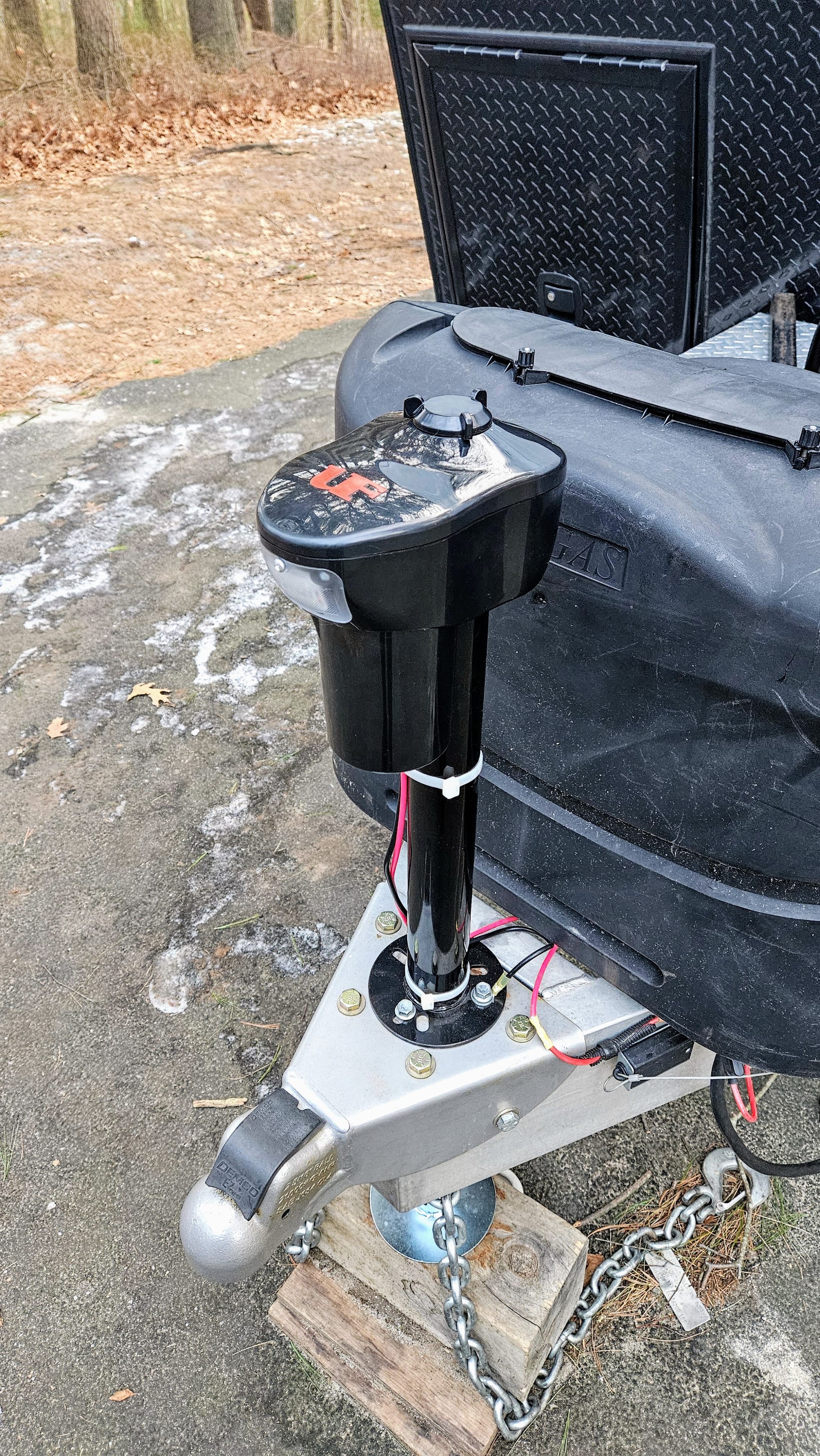
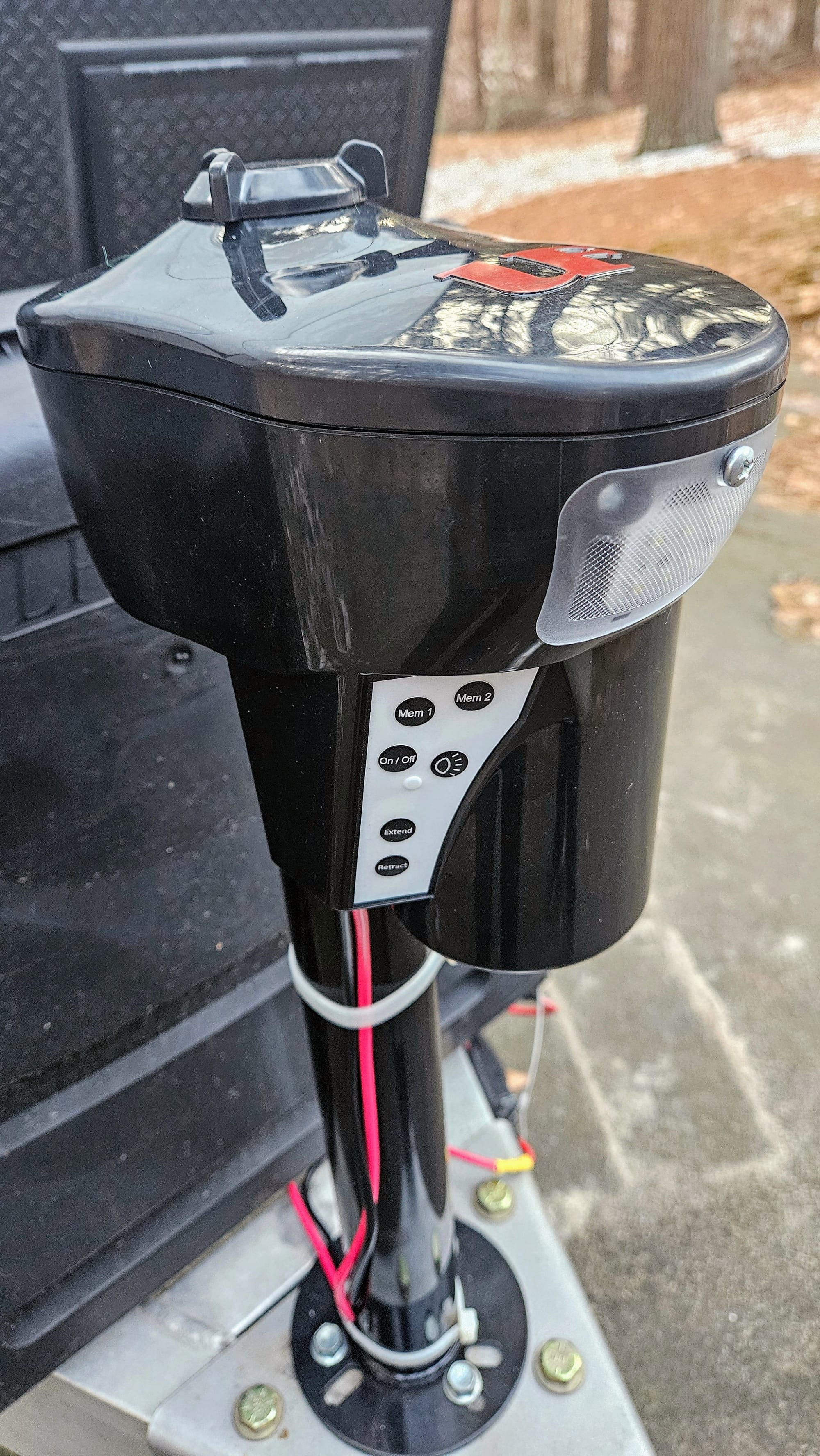
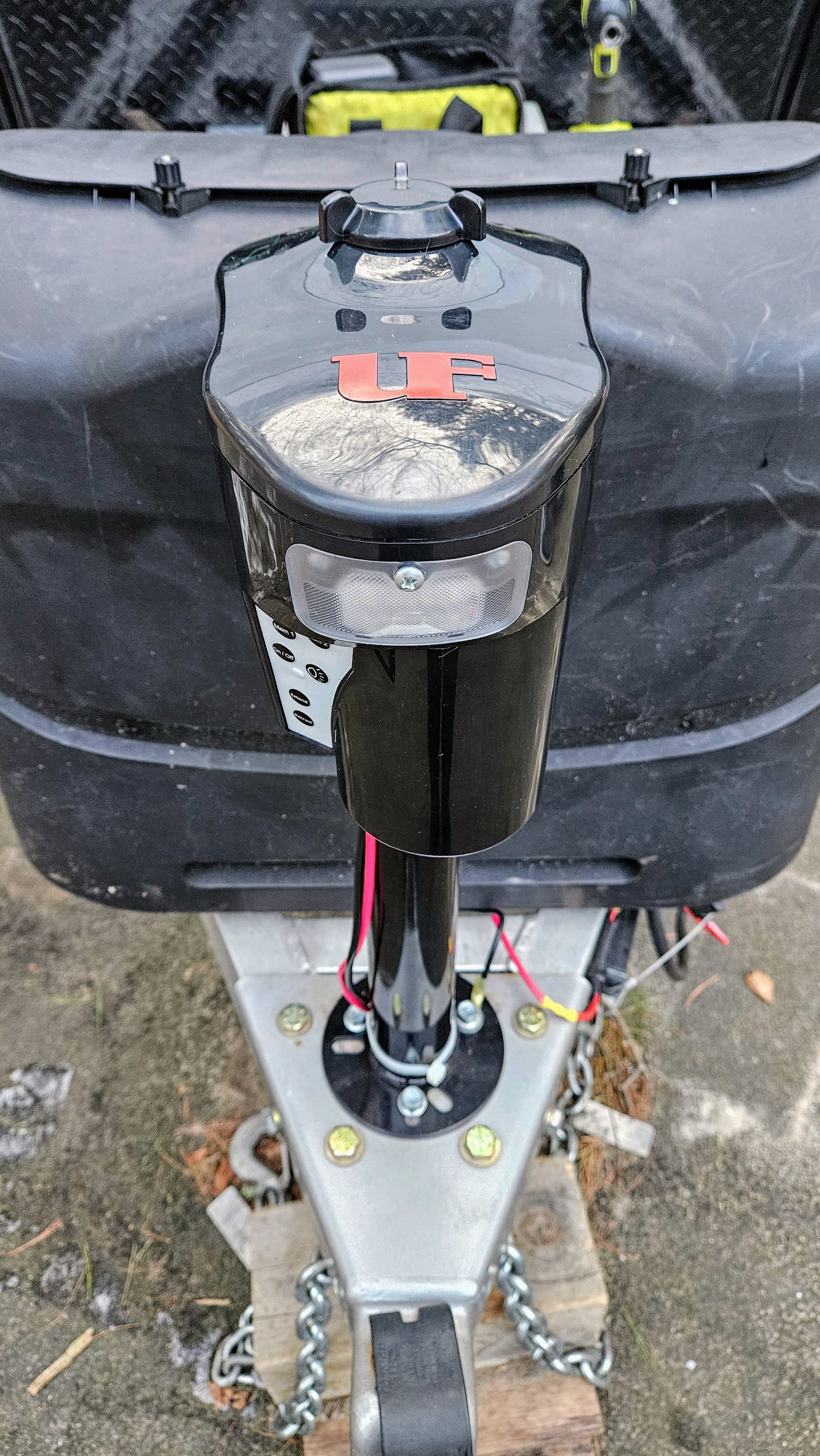
There was no better time to finish installing the hitch. It was a balmy 38°F out, and we were finally making good headway with repairs. We had the mobile tech finish the hitch installation, too, because sometimes it just makes sense to be time efficient and let the pros handle it.
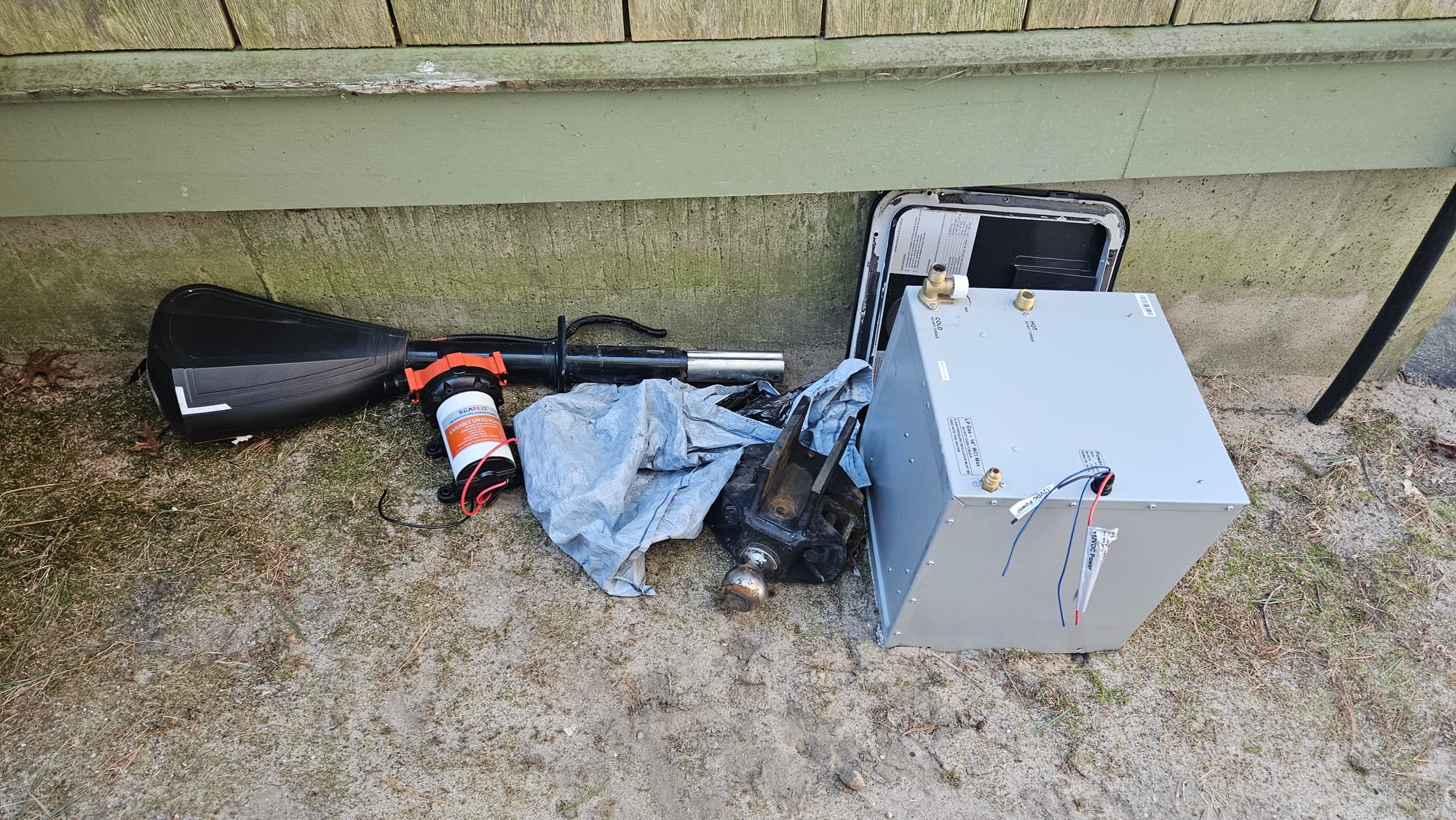
Heat was back, water was back, hitch was installed, and the jack was replaced. Those were the top priorities that we wanted done before hitting the road, and for the first time in weeks, we could actually see the light at the end of the tunnel. Now we just needed an open window of time. When we first delayed our launch, we tentatively set our sights on MLK Weekend because we could blitz south without worrying about work obligations. But it's January, and in January, crazy weather can wreak havoc on any part of the country at any time. Could we avoid it successfully? It was time to bargain with the weather gods and hope they'd give us an opportunity to finally get on the road.
Big thanks to Mass Mobile RV for helping us out in our time of need!
